Page by Page: The Impactful Voyage of Read with a Teacher
Compiled by Chandan Jha and Murari Jha
We are delighted to present you with this curated compilation, marking the three-year anniversary of our global "Read with a Teacher" program. This initiative has connected thousands of teachers and stakeholders in education from around the globe, fostering dialogue, encouraging professional growth, and furthering our collective mission to deliver excellent education. Over the past three years, our community has poured over 50 diverse and impactful books, each one expanding our understanding of education and inspiring new pedagogical ideas. This document includes a comprehensive list of 50 of these influential books, each accompanied by a succinct introduction and an attached video link for further insights. By our estimate, even if only 10 people read each book, investing 20 hours per book, that's an astounding collective effort of 10,000 hours! This figure is a testament to the commitment, dedication, and passion of our educational community, and it demonstrates the transformative power of collective reading and learning. This document is not just a collection of books; it's a testament to the sweat and soul put in by diverse stakeholders across the educational ecosystem. We hope that it will serve as an invaluable resource for teachers and education scholars, sparking further discussions, expanding horizons, and encouraging deeper engagement within the field.
- Ek School Manager Ki Diary by Farah Farooqui is a book that chronicles the experiences and challenges of a school manager who works in a government-aided school in India. The book is based on the author’s own diary entries, which she wrote during her tenure as a school manager. The book provides a rich and detailed account of the various aspects of running a school, such as curriculum, pedagogy, administration, finance, community engagement, and power dynamics. The book also explores the issues and conflicts that arise between the school, the state, the neighborhood, and the society at large .The book is a valuable resource for teachers who want to gain insights into the realities and complexities of working in a public education system. The book offers a critical and reflective perspective on the role and responsibilities of a school manager, who has to balance the needs and expectations of different stakeholders, while also ensuring the quality and equity of education for the students. The book also highlights the achievements and struggles of the students, teachers, and parents who are part of the school community3. The book is written in a simple and engaging language, with anecdotes, dialogues, and illustrations that make it easy to read and relate to4. The book is not only informative, but also inspiring and thought-provoking for anyone who is interested in education and social change. When I am writing this, it’s English version has been published by Routleg with the title, “Education in a 'Ghetto': The Paradoxes of a Muslim-Majority School”
- Children's Language and the Teacher by Krishna Kumar is an insightful handbook designed for educators working with pre-school and primary school students, which underscores the significant role of language in children's development. Structured in four parts, the book unfolds a comprehensive understanding of language, its multifaceted functions, and its evolution in children. It presents practical strategies for fostering a positive atmosphere conducive to enriching conversations in classrooms, and guides teachers on how to respond to children's talk to boost their language growth. Furthermore, the book delves into the intricate relationship between oral language and literacy development, offering valuable advice to make classrooms more language-rich environments. Teachers will greatly benefit from this read as it provides a profound understanding of language functions in children, showcases ways to create a conversational classroom ethos, explores the link between oral language and literacy, and ends with a summarization of key points and suggestions for additional reading. Thus, it serves as an indispensable resource for educators aiming to enhance their students' language skills and overall development.
3. Divaswapan, a book authored by Gijubhai Badheka, is a delightful collection of short stories that stir the imagination and creativity of young minds. The narratives, brimming with awe and adventure, promote a child's imaginative exploration of their surroundings. This book is an excellent resource for educators as it highlights the significance of imagination in a child's cognitive development, demonstrating how imaginative thinking aids learning, problem-solving, and creative expression. Furthermore, the book can help foster a passion for reading and writing among children. "Divaswapan" is a beautifully penned compilation, encompassing captivating and emotionally engaging stories that appeal to children across various age groups. Teachers delving into this book can draw inspiration to infuse their classrooms with more imaginative activities. It provides a profound understanding of the role of imagination in child development, offers an array of enchanting stories for sharing with students, and ignites ideas for imaginative classroom practices.
4. Totto-chan: The Little Girl at the Window is an autobiographical novel by Tetsuko Kuroyanagi that recounts her experiences at Tomoe Gakuen, an innovative school in Japan. The book is a heartening tale underscoring the significance of creativity, imagination, and individuality in education. It serves as an invaluable resource for educators by highlighting the essence of these elements in classroom settings. The narrative illuminates how a child-centric education approach can enable children to flourish and actualize their full potential, also offering teachers pragmatic suggestions on crafting a more imaginative and creative learning atmosphere. This book offers insights into a child's mind, enabling teachers to comprehend children's learning mechanisms, showcasing the efficacy of a child-focused approach in education. It presents practical strategies for establishing an environment that stimulates creativity and imagination. Furthermore, "Totto-chan" is an inspiring read that promotes understanding and patience towards students, inspires innovation in teaching methods, and assists in the creation of a positive, supportive learning milieu. Overall, it is an essential read for any teacher aiming to foster a conducive learning environment that supports their students' growth
5. Cleverlands by Lucy Crehan is an insightful book that delves into the education systems of five top-ranking nations in international tests - Finland, Singapore, Japan, Shanghai, and Canada. Through her journey across these countries, interviews with teachers, students, and policymakers, and backed by her experiences as an educator and extensive educational research, Crehan presents a unique perspective on what makes these systems so efficacious. This book provides a global outlook on education, underscores the crucial role of teacher quality, explores the influence of culture in education, and offers practical suggestions for educational improvement. For educators, "Cleverlands" is an indispensable read that not only broadens understanding of varied educational philosophies worldwide, but also inspires innovative teaching methodologies and helps foster a supportive and positive learning environment. Therefore, it's a valuable resource for any teacher aiming to enhance their teaching practice and learn more about global educational approaches.
6. Why Children Fail, a book by John Holt published in 1964, critically challenges the traditional schooling system, arguing that it may often do more harm than good to a child's true learning capability and desire. Drawing from his personal experiences as a teacher and the latest educational research, Holt proposes alternative education approaches. This book serves as an indispensable read for teachers as it provides a child-centric approach to learning and offers practical advice to those aiming to establish more engaging and effective learning environments. "Why Children Fail" stimulates educators to rethink their teaching methodologies, understand the diverse learning patterns of children, inspires creativity and innovation in teaching, and assists in crafting a positive, supportive learning setting for students. Consequently, it is a vital read for teachers seeking to transform their pedagogical approach.
- Ikigai," a book by Hector Garcia and Francesc Miralles, delves into the Japanese concept of ikigai, often translated as "a reason for being," positing it as the secret to a long, fulfilling life. This book is an insightful read for teachers, offering a fresh perspective on happiness and fulfillment and helping them appreciate the role of ikigai in their lives and their students'. The book proposes a framework for identifying one's ikigai and shares practical advice for leading a more enriching life. Reading "Ikigai" can help teachers understand the significance of passion, purpose, and community in living a satisfying life. It can inspire creativity and innovation in their teaching approaches and aid in building a supportive, positive learning environment for their students. Therefore, it is an inspiring, thought-provoking book that encourages teachers to discover their own ikigai and assist their students in doing the same.
- Educating the Educator, penned by J. Krishnamurti in 1948, is a critical examination of the education system, asserting that it falls short of preparing students for the complexities of the 21st century. Krishnamurti advocates for an innovative educational approach emphasizing the development of the whole person beyond mere intellectual capacity. Reading this book encourages teachers to reflect on their roles within the education system critically, furnishing them with a framework to comprehend the purpose of education and create a more holistic learning environment. The book challenges the orthodox view of education, proposes a child-centered learning approach, and gives practical advice to educators eager to create a more engaging and effective learning sphere. Thus, it is a must-read for teachers aspiring to reshape their teaching methodologies. It aids in understanding the diverse learning styles of children, spurs creativity and innovation in teaching, and assists in establishing a positive, supportive learning environment for students.
- The Courage to Teach, authored by Parker J. Palmer and published in 1997, posits teaching as a heartfelt vocation requiring bravery. Palmer urges teachers to confront their inner conflicts courageously and cultivate profound connections with their students. Teachers should delve into this book to grasp the significance of their profession and unearth the courage to be authentic in the classroom. The book lays out a framework for comprehending the emotional dimensions of teaching and crafting a more impactful learning journey for students. It offers a fresh outlook on teaching as a vocation, practical advice on establishing deeper bonds with students, and underscores the value of personal growth and development for educators. Consequently, "The Courage to Teach" is a vital read for any teacher yearning for a deeper sense of purpose and satisfaction in their profession.
- Into the Wild, penned by Jon Krakauer, tells the true tale of Christopher McCandless, a youth who relinquished his possessions, hitchhiked to Alaska, and survived in the wilderness for a few months until his untimely demise. The book probes into McCandless's reasons for his voyage, his wild experiences, and his ultimate death while also contemplating the essence of happiness, significance of community, and boundaries of self-sufficiency. Teachers should delve into "Into the Wild" as it offers a prolific resource to instruct students on diverse themes including critical thinking, potential dangers of idealism, significance of thorough preparation, raw power of nature, and the necessity of community and connection. Further, it can ignite discussions on various other topics such as the influence of media on our worldview, the true nature of happiness, the worth of pursuing one's dreams, and the limits of self-reliance.
- Pedagogy of the Oppressed," a seminal work by Brazilian educator Paulo Freire, is considered a cornerstone text of critical pedagogy. First written in Portuguese between 1967 and 1968, it made its debut in Spanish in 1968, followed by an English version in 1970, and finally released in the original Portuguese in Portugal and Brazil in 1972 and 1974 respectively. In the book, Freire critiques traditional education as a form of oppression that tacitly encourages the oppressed to accept their circumstances and forgo challenging the status quo. Instead, he suggests a transformative pedagogy anchored in dialogue and critical thinking, empowering the oppressed to strive for liberation. Teachers should read "Pedagogy of the Oppressed" for its profound insights into how education can serve as a tool for oppression or liberation, as well as for practical advice on establishing a critical pedagogy in their classrooms. It offers a refreshing view of education as a vehicle for liberation, and advises on fostering a learning environment that encourages dialogue and critical thought while underscoring the importance of empowering students to strive for their own freedom. This is an essential read for teachers aspiring to create a more equitable and just learning environment.
- Democratic Schools, a book penned by Michael Apple and James A. Beane and published in 1995, is a compilation of essays examining the notion of democratic education and its possible implementations in schools. Rather than simply teaching students about democracy, the authors argue that it's about cultivating a democratic learning environment where students participate actively in their own education. The book furnishes real-world examples of democratic schools across the globe, alongside practical advice for educators aiming to democratize their classrooms. Teachers should peruse "Democratic Schools" to grasp the fundamentals of democratic education and construct a more democratic learning environment in their classrooms. Some key reasons for teachers to read this book include its lucid exposition of democratic education principles, practical advice on creating a democratic learning environment, and tangible examples of democratic schools worldwide. Overall, "Democratic Schools" is a must-read for any educator striving to foster a more equitable and just learning environment.
- Escape from Childhood, published in 1974, John Holt argues that traditional schooling hinders children's true learning potential, drawing on his personal teaching and research experiences to bolster this belief. The book scrutinizes conventional views on childhood, suggesting that children ought to be seen as responsible individuals capable of making their own decisions. Holt proposes alternative education methods like unschooling and homeschooling. Teachers should delve into "Escape from Childhood" to comprehend diverse learning styles and foster a child-centered learning environment. The book also encourages educators to question their preconceived notions about childhood and education. It offers specific reasons for teachers to read it: challenging traditional childhood views, advocating a child-centered learning approach, and providing pragmatic advice for developing a child-centric learning environment. In essence, "Escape from Childhood" is a crucial read for educators who aspire to create a more supportive and engaging learning environment for their students.
- Choori Bazar mein ladki is a book by Krishna Kumar, a renowned educationist and former director of NCERT. The book explores how the socialization and education of women in India shape their self-image and limit their potential. The book analyzes the cultural myths, norms, and practices that confine women to a narrow role of being an ideal woman, who is submissive, obedient, and dependent on men. The book also examines how the family, society, education, and religion influence the development of girls from childhood to adulthood, and how they are molded into the patriarchal system. The book is a must-read for teachers who want to understand the challenges and opportunities that women face in India, and how they can empower them to break free from the stereotypes and constraints that hinder their growth. The book also offers insights into how teachers can create a more gender-sensitive and inclusive curriculum that respects the diversity and dignity of women.
- Freedom from the Known is a book by Jiddu Krishnamurti, a renowned philosopher and spiritual teacher. The book reveals how we can free ourselves from the limitations and conditioning of our mind, and how we can discover a new way of living that is based on awareness, insight, and compassion. The book challenges us to question our assumptions and beliefs about ourselves, others, and the world, and to see things as they are, not as we want them to be. The book also explores the nature of truth, love, fear, violence, and freedom, and how they are related to our daily life. The book is a must-read for teachers who want to learn more about themselves and their role in education, and who want to help their students develop a holistic and creative intelligence that goes beyond knowledge and information. The book is a profound and radical inquiry into the human condition that can transform our consciousness and our society.
- Deewar Ka Istemaal Aur Anya Lekh is a book by Krishna Kumar, a renowned educationist and former director of NCERT. The book is a collection of essays that reflect on various aspects of education, culture, and society in India. The book covers topics such as the role of textbooks, the politics of language, the impact of colonialism, the challenges of secularism, the meaning of nationalism, and the relevance of Gandhi. The book is a must-read for teachers who want to gain a deeper and critical understanding of the Indian education system and its historical and contemporary contexts. The book also offers insights into how teachers can make their classrooms more democratic, creative, and dialogical, and how they can foster a culture of inquiry and curiosity among their students. The book is a stimulating and provocative exploration of education and its relation to society that can inspire teachers to rethink their practice and purpose.
19. I Read It, But I Don't Get It" is a compelling book by Cris Tovani, that elucidates the struggles faced by adolescent readers and proposes strategic solutions to overcome them. Tovani employs her extensive teaching experience to bring forth real-world classroom anecdotes, illustrating how students engage and often struggle with reading. It is not only an enlightening expose of the reading process from a student's perspective, but also a practical guide that offers strategies for instruction, covering diverse areas like comprehension, assessment, and creating a classroom environment conducive to reading. Teachers should read this book because it provides an invaluable toolkit of adaptable strategies that can help shape their teaching methods to better assist students in improving their reading comprehension. Additionally, it offers profound insights into the minds of struggling readers, which can help teachers better understand and cater to their needs.
20. Flip the System is a thought-provoking book by René Kneyber and Jelmer Evers that presents a radical proposal for transforming the education system. The authors argue against top-down educational reform, and instead promote a bottom-up approach where teachers, as the heart of the education system, are entrusted with the responsibility and authority to shape educational policies. The book features an international collection of teachers, academics, and thought leaders, who share their experiences and strategies on how to "flip" the education system. Teachers should read this book because it empowers them to take ownership of their profession and provides fresh perspectives on systemic educational change. It underlines the importance of teachers' voices in policy-making decisions, and offers strategic insights for improving classroom practice and the broader educational landscape. "Flip the System" can inspire teachers to reclaim their profession and reshape education for the benefit of their students.
- Kachaharinama is a book by Manish Bhargav that was published in 2016. The book is a collection of short stories that explore the lives of people who work in the Indian legal system. The stories are set in a variety of locations, from small towns to big cities, and they feature a wide range of characters, from lawyers and judges to clerks and litigants. Bhargav's stories offer a glimpse into the workings of the Indian legal system, as well as the challenges that people face when they come into contact with it.
- The Process of Education by Jerome Bruner is a landmark book in the field of education, underlining the importance of the learning process and the teacher's role in fostering it. First published in 1960, the book explores the concept of a spiral curriculum that reintroduces topics at increasing levels of difficulty to enhance a learner's understanding and retention. Bruner advocates for the concept of discovery learning, arguing that students better retain information discovered on their own. Teachers should read "The Process of Education" because it provides a foundational understanding of educational psychology and the significance of process-oriented teaching. It equips teachers with a different perspective on how students learn, emphasizing understanding over memorization, and allows them to design instructional strategies that support this method of learning. Bruner's work remains a seminal contribution to the teaching profession, inspiring educators to foster a learning environment that stimulates curiosity and critical thinking in their students.
- Shiksha: My Experiments as an Education Minister is a comprehensive book written by Manish Sisodia, Deputy Chief Minister and Education Minister of Delhi, where he shares his journey and experiences of transforming the education system in Delhi. The book documents an inspiring narrative of systemic changes, from infrastructure improvements to teacher training programs and parent engagement strategies, all aimed at fostering an enriched learning environment. Teachers should read this book because it not only offers an insightful account of real-world, large-scale education reform, but also places a strong emphasis on the pivotal role of teachers in this transformation. It portrays how teacher motivation, professional development, and empowerment directly impact student outcomes. Reading "Shiksha" can offer teachers a renewed sense of purpose and inspire them to be agents of change within their own classrooms and beyond.
- Wings of Fire is an autobiographical work by the late Dr. A.P.J Abdul Kalam, the esteemed scientist and former President of India. The book encapsulates his inspiring journey from a humble background to becoming a leading figure in India's space and nuclear programs, and finally the President of the nation. The narrative is replete with lessons on resilience, dedication, and the ceaseless pursuit of knowledge, despite numerous challenges. Teachers should read "Wings of Fire" as it imparts valuable lessons that can be utilized in their own teaching practices. It can help educators inspire students with real-life examples of perseverance and the importance of staying curious and committed to learning. Furthermore, it offers educators an understanding of how to imbue their students with values such as humility, hard work, and a strong sense of purpose, attributes that were instrumental in Dr. Kalam's remarkable life.
- Raag Darbari is a satirical Hindi novel written by Shrilal Shukla, offering a biting critique of the post-independence Indian society and bureaucracy. The book presents the story of a small village in Uttar Pradesh, highlighting the machinations of local politics, the often absurd bureaucracy, and the chasm between urban and rural India. It is renowned for its starkly realistic portrayal of social and political dynamics and its keen observations of the human condition. Teachers, especially those who instruct social sciences, literature, and history, should read "Raag Darbari" as it offers invaluable insights into Indian society, politics, and culture, and engages with themes that remain relevant today. The novel can aid teachers in facilitating thought-provoking discussions about societal structures, corruption, and power dynamics. Its satirical tone and rich language also make it an excellent resource for language and literary analysis, enhancing students' understanding of Hindi literature's depth and diversity.
- Leading in a Culture of Change is an influential book by Michael Fullan that offers essential insights into the complex dynamics of leading and managing change in an increasingly complex world. Fullan addresses how leaders can cope with the rapid pace of change, emphasizing that effective leadership is not about simply reacting to change, but about creating a culture where change is anticipated and adapted to. This book is crucial for teachers, especially those in leadership roles, as it provides a comprehensive framework for dealing with change in an educational setting. It empowers educators with strategies and principles necessary to lead in times of transition, fostering a culture of learning and inclusivity. Moreover, it allows teachers to develop a nuanced understanding of the interplay between leadership and change, which is instrumental in navigating the evolving landscapes of education.
- My Experiment with Truth is the autobiography of Mahatma Gandhi, a figure who needs no introduction. This seminal work provides a profound look into Gandhi's life, his philosophy of truth and non-violence, and his struggle for India's independence. The book encapsulates his journey from his early years in Gujarat, his studies in London, his experiences in South Africa, to his leadership in India's independence movement. Teachers should read this book as it is a rich repository of lessons on integrity, resilience, and the pursuit of truth. It provides educators with real-life narratives that can be used to impart values of non-violence, justice, and moral courage to their students. Furthermore, "My Experiment with Truth" presents an in-depth examination of a significant historical period and the life of one of the world's most influential figures, making it a valuable resource for social studies and history instruction.
- Ideology and Curriculum by Michael W. Apple is a groundbreaking work in the field of education studies. The book delves into the intricate relationship between education, power, and social control, arguing that school curricula are not neutral but are influenced by political, social, and economic forces. Apple uses a critical lens to explore how dominant ideologies are often reproduced within schools and how these ideologies shape the education students receive. Teachers should read "Ideology and Curriculum" as it helps them understand the broader socio-political context of the education system. It equips educators with a critical perspective, enabling them to question and challenge entrenched systems of power and knowledge within their classrooms. This book can help teachers make their pedagogical practices more inclusive and equitable, thereby ensuring a more just and comprehensive education for all their students.
- Nirmala is a classic Hindi novel written by one of India's most celebrated authors, Munshi Premchand. The story centers around its protagonist, Nirmala, a young girl who becomes a victim of a societal norm where she is forced to marry an older man after her arranged marriage is abruptly called off due to a lack of dowry. Premchand masterfully narrates Nirmala's life and struggles, highlighting the grim reality of social issues like child marriage and the dowry system in the early 20th century India. The novel is a profound critique of the socio-economic condition of that era, particularly focusing on the plight of women. Premchand's powerful storytelling and deep empathy for his characters makes "Nirmala" a compelling and moving read.
- Bachche Masheen Nahi hain by Alok Mishra is a book that explores the education system in India and how it affects the children and teachers. The book is based on the author’s personal experiences and observations as a teacher and a researcher. The book criticizes the mechanistic and oppressive nature of the school system that stifles the creativity, curiosity, and freedom of children, and makes them into passive and obedient machines. The book also challenges the teachers to question their role and responsibility in the education process, and to transform their practice into a more democratic, dialogical, and liberating one. The book is a must-read for teachers who want to understand the challenges and opportunities that children face in India, and how they can empower them to break free from the stereotypes and constraints that hinder their growth. The book also offers insights into how teachers can create a more gender-sensitive and inclusive curriculum that respects the diversity and dignity of children.
- The Adventures of Rusty is a delightful and engaging book written by the renowned author Ruskin Bond. The book is a collection of stories that revolve around the young and imaginative protagonist, Rusty, who is also a semi-autobiographical character based on Bond's own childhood experiences. Set amidst the scenic backdrop of the Indian Himalayas, the tales depict Rusty's explorations, friendships, school days, and his interactions with various animals and nature. Ruskin Bond's evocative storytelling imbues the narrative with a sense of adventure and wonder, making it a captivating read for children and adults alike. "The Adventures of Rusty" is not just a simple storybook, but a celebration of childhood, imagination, and the joy of discovering the world around us.
- Summerhill: A Radical Approach to Child Rearing is an influential book by A. S. Neill that introduces readers to the progressive educational philosophy practiced at Summerhill School in England. Neill promotes a learner-centered approach where children are given the freedom to pursue their own interests and are not obligated to attend classes. He posits that such an approach allows for the holistic development of a child, fostering creativity, curiosity, and emotional well-being. Teachers should read this book as it challenges traditional notions of schooling and provides an alternative perspective on education. While the Summerhill model may not be universally applicable, its emphasis on child autonomy, democratic decision-making, and experiential learning can inspire educators to reconsider their teaching strategies. The book encourages teachers to create a more flexible and nurturing learning environment that respects children's individuality and fosters their intrinsic motivation to learn.
- Teacher by Sylvia Ashton Warner is a poignant memoir that chronicles her experiences as an educator in rural New Zealand, particularly focusing on her work with Maori children. Warner presents her innovative teaching methodologies, emphasizing individual creativity, organic learning, and the integration of students' cultural backgrounds into the curriculum. The book illuminates her belief in the power of personal narratives and experiential learning as tools to engage and educate children. Teachers should read this book because it provides a refreshing perspective on pedagogy, emphasizing the importance of understanding and integrating students' cultural identities into the learning process. "Teacher" encourages educators to foster an inclusive, culturally responsive learning environment and can inspire them to adopt innovative, student-centered teaching methods. Ashton Warner's book is a testament to the profound impact that creative and empathetic teaching can have on students' lives.
- Subhas Chandra Bose aur Azad Hind Fauz by Dr. Ashok Tiwari is a book that narrates the history and achievements of the Indian National Army (INA), also known as the Azad Hind Fauj, which was an armed force formed by Indian nationalists in 1942, under the leadership of Subhas Chandra Bose, a renowned freedom fighter. The book describes how Bose reorganized the INA after taking over from Rash Behari Bose, and how he mobilized thousands of volunteers from India and abroad to join the INA. The book also depicts the military campaigns and battles that the INA fought against the British forces in Burma, Malaya, and India, and how they established the provisional government of Azad Hind in Singapore. The book also analyzes the impact and legacy of the INA on the Indian freedom struggle, and how they inspired millions of Indians to rise up against the British rule. The book is a must-read for anyone who wants to learn more about the life and vision of Subhas Chandra Bose, and the heroic sacrifices and contributions of the INA soldiers.
- Belonging: A Culture of Place is a thought-provoking book by renowned author, feminist, and social critic, bell hooks. The book is a collection of essays that explore themes of home, identity, and the sense of belonging, set against the backdrop of the Southern United States. hooks intertwines personal narratives, historical accounts, and critical analysis to interrogate issues like race, gender, class, and environmentalism, ultimately examining what it means to truly belong to a place. Teachers should read "Belonging: A Culture of Place" as it offers profound insights into the complexities of identity and the power of place in shaping an individual's experiences. It challenges educators to consider their students' diverse backgrounds and experiences, which can enhance their teaching practices. Additionally, the book can serve as a valuable resource for facilitating discussions on socio-cultural issues, fostering a more inclusive and understanding learning environment.
- Nudge: Improving Decisions About Health, Wealth, and Happiness is a highly influential book by Richard H. Thaler and Cass R. Sunstein. The authors introduce the concept of 'libertarian paternalism', arguing that the design of choices impacts human behavior, and that these choices can be structured in a way that 'nudges' individuals towards better outcomes without restricting their freedom. Thaler and Sunstein provide a wide range of examples from various fields, demonstrating the power of nudges in influencing decision-making. Teachers should read "Nudge" as it offers insights into how they can subtly steer students towards more beneficial choices and behaviors, thereby enhancing learning outcomes. The concepts in the book can be applied to classroom management, instructional design, and student engagement strategies, enabling teachers to create a learning environment that supports students in making effective decisions about their learning and growth.
- Vivekananda: A Biography by Swami Nikhilananda provides a detailed and thoughtful exploration of the life and teachings of Swami Vivekananda, one of India's most influential spiritual leaders. The book recounts Vivekananda's journey from his early life and spiritual awakening to his role in spreading Vedanta philosophy in the West, including his impactful speech at the Parliament of the World's Religions in Chicago in 1893. The biography highlights his profound teachings on self-realization, service, tolerance, and the unity of religions. Teachers should read this book as it provides a deep understanding of Vivekananda's philosophy, which can inspire them in their personal and professional lives. The book can serve as a resource for fostering values like empathy, perseverance, and unity among students. Furthermore, teachers of religious studies, philosophy, and history would find this biography particularly useful in providing context and deeper insights into one of the pivotal figures in spiritual and philosophical thought.
- The Draft National Professional Standards for Teachers (NPST), circulated by the National Council for Teacher Education (NCTE), Delhi, represents a comprehensive framework outlining the professional expectations and competencies for teachers in India. The NPST covers various aspects of teaching, including subject matter knowledge, pedagogical practices, assessment methods, professional development, and ethical conduct. The document serves as a guide for improving the quality of teaching and learning, facilitating teachers' continuous professional development, and raising the overall standards of the teaching profession. Teachers should read the NPST because it provides a clear roadmap for their professional growth and performance. It helps them understand the skills and knowledge they need to acquire and develop, the values they need to uphold, and the professional responsibilities they need to fulfill. By aligning their teaching practices with the standards outlined in the NPST, teachers can enhance their effectiveness and contribute more significantly to improving student outcomes.
- Padhna Zara Sochna is a book by Krishna Kumar, a renowned educationist and former director of NCERT. The book explores how reading can be a source of joy, curiosity, and critical thinking for learners and teachers. The book analyzes the various factors that influence our reading habits, such as the social context, the educational system, the language policy, the cultural values, and the personal preferences. The book also suggests how we can improve our reading skills and develop a deeper and broader understanding of the world through reading. The book is a must-read for teachers who want to enhance their own reading experience and inspire their students to read more. The book also offers insights into how teachers can create a more democratic, creative, and dialogical classroom environment that fosters a culture of inquiry and curiosity among learners. The book is a stimulating and provocative exploration of reading and its relation to education and society that can inspire teachers to rethink their practice and purpose.
40. The Biology of Belief
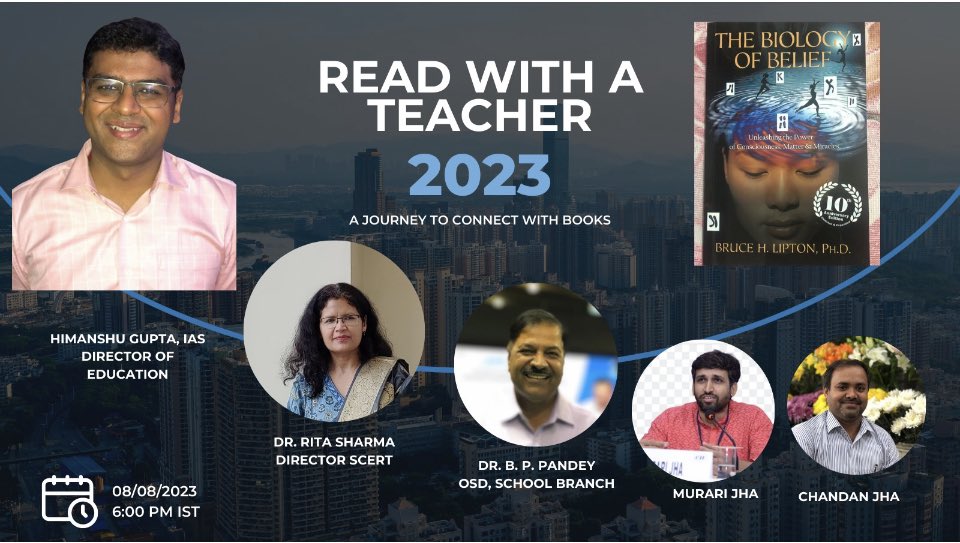
The Biology of Belief by Dr. Bruce Lipton presents a groundbreaking exploration of the relationship between science and spirituality, challenging traditional views of biology. Lipton, a cell biologist, argues that our beliefs and perceptions, rather than our genes, play a crucial role in shaping our biology and overall health. He draws on the principles of quantum physics, epigenetics, and neuroscience to explain how our thoughts can influence our cells and genetic expression.
The book emphasizes the power of positive thinking, demonstrating that beliefs have a tangible impact on our physical well-being. Lipton introduces the concept that the mind acts as a "control center" for our biology, suggesting that by changing our perceptions and subconscious programming, we can rewire our physiology. This revolutionary perspective challenges the idea that we are victims of our genetic inheritance, empowering readers to take control of their health and life outcomes through conscious belief and mental conditioning.
41. Writing for children by Manorma Jafa
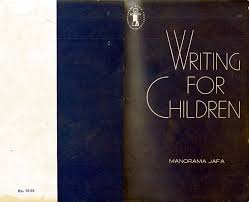
Writing for Children by Manorama Jafa is a guide aimed at aspiring authors interested in creating literature for young readers. The book delves into the nuances of writing stories, poems, and other content tailored to children’s developmental stages and interests. Jafa emphasizes the importance of simplicity, creativity, and cultural relevance in children's writing, offering practical advice on language, style, and themes. Her insights are particularly valuable for those looking to inspire young minds while respecting their intelligence and curiosity. The book is a useful resource for educators, writers, and anyone passionate about children's literature.
https://youtu.be/CcLNRtkYqj4?si=enJT-cEIiunIwvYB
42. What did you ask at School Today
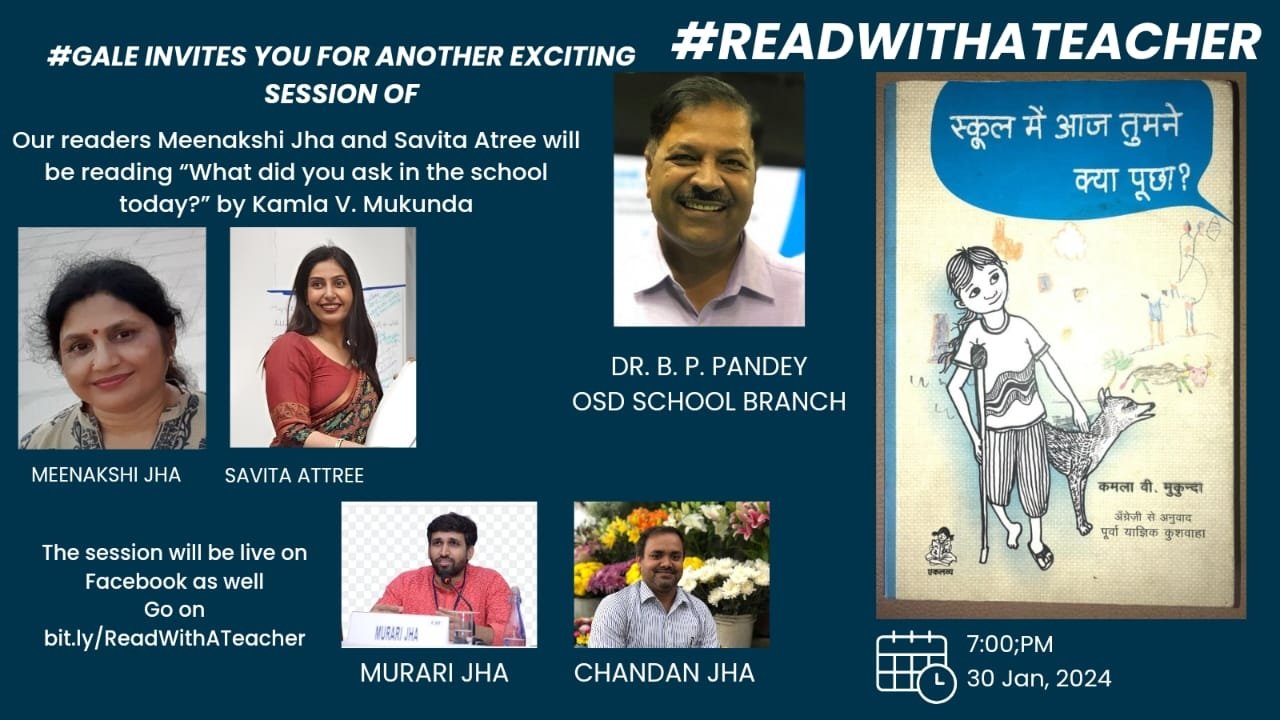
What Did You Ask at School Today? by Kamala V. Mukunda explores the complexities of learning and education from a psychological perspective. The book focuses on how children think, learn, and develop, offering insights for parents, teachers, and educators on understanding and nurturing a child’s cognitive and emotional growth. Mukunda addresses important questions about the nature of curiosity, motivation, and the role of school in a child’s life. By blending research with practical examples, the book encourages adults to foster a more meaningful and engaging learning experience for children, promoting inquiry and critical thinking over rote memorization.
https://youtu.be/JLCHZNer0QQ?si=sG5vfs9kcAq3-Nr0
43. What is worth Teaching
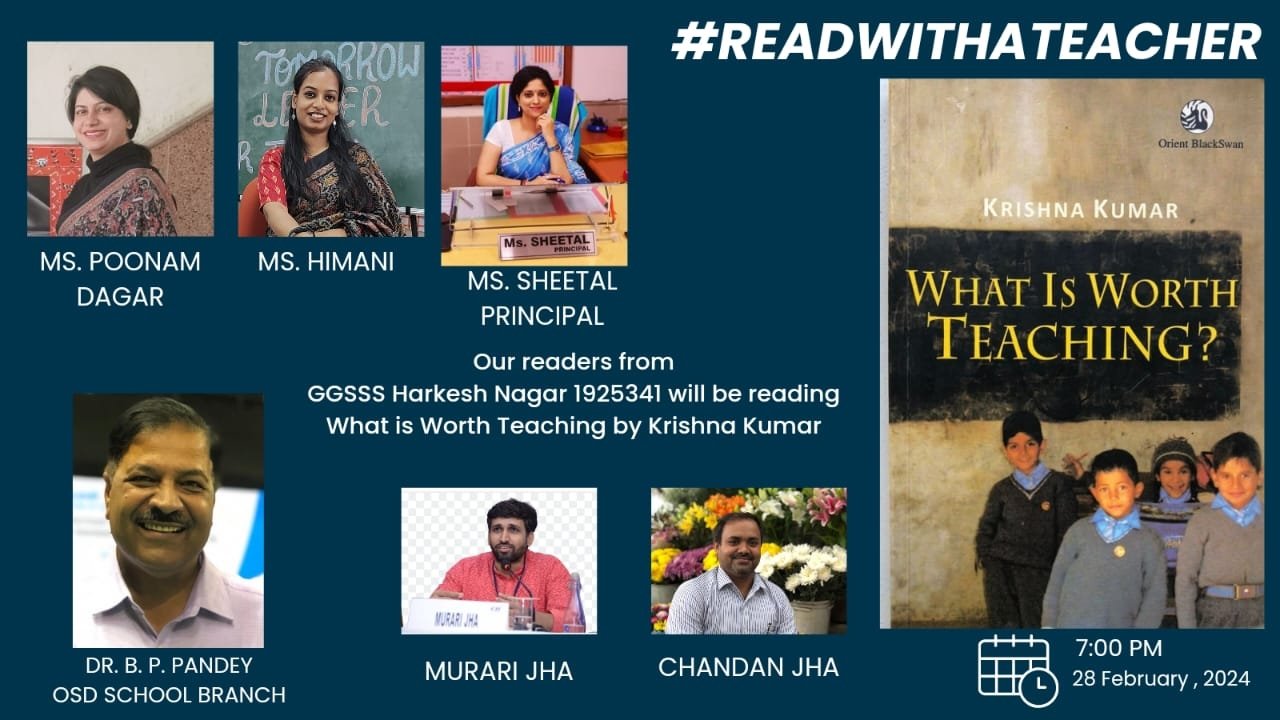
What is Worth Teaching? by Krishna Kumar is a thought-provoking exploration of the Indian education system and its curriculum. The book critically examines what schools prioritize in teaching and challenges conventional ideas about what constitutes valuable knowledge. Kumar advocates for a curriculum that emphasizes critical thinking, creativity, and understanding over mere factual recall. He also highlights the influence of colonialism and societal structures on the content taught in Indian schools. Through this analysis, the book encourages educators, policymakers, and readers to rethink the purpose of education and the true worth of what is being taught to students.
https://youtu.be/ooCyzxCwzkI?si=zLPIzEZfpNtw4_v0
44. 10 Billion
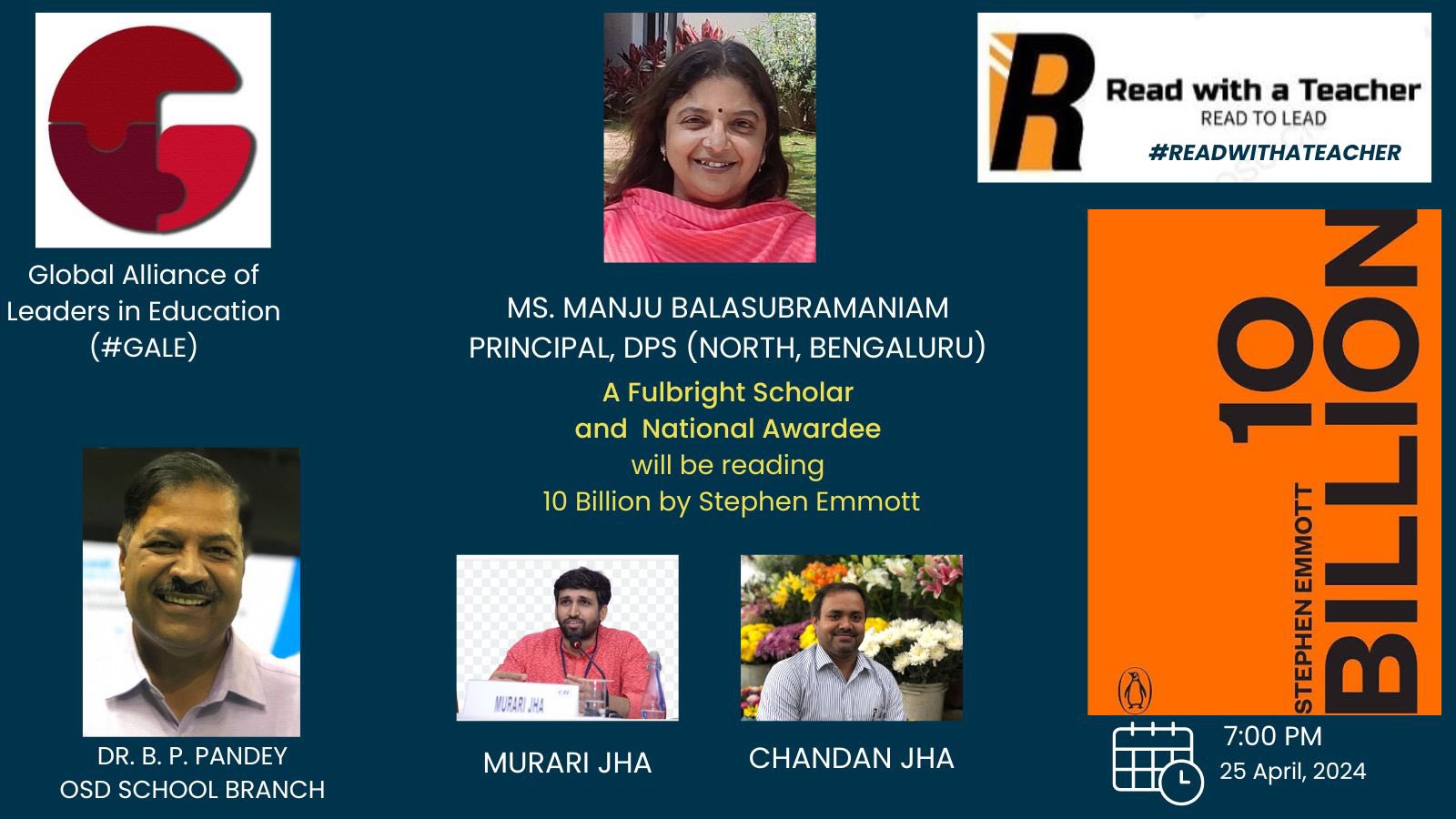
10 Billion by Stephen Emmott is a stark and urgent examination of humanity's impact on the planet as the global population approaches 10 billion. Emmott highlights the devastating consequences of overpopulation, resource depletion, climate change, and environmental degradation. Through a blend of scientific data and alarming projections, he argues that our current path is unsustainable, and drastic changes are necessary to avert ecological collapse. The book paints a grim picture of the future, urging readers to confront the environmental crisis and rethink their lifestyles, consumption patterns, and the global systems that contribute to the planet's decline.
https://youtu.be/ReEOjDBPCfU?si=khv6I8GgGLwaZ0kQ
45. Metronama
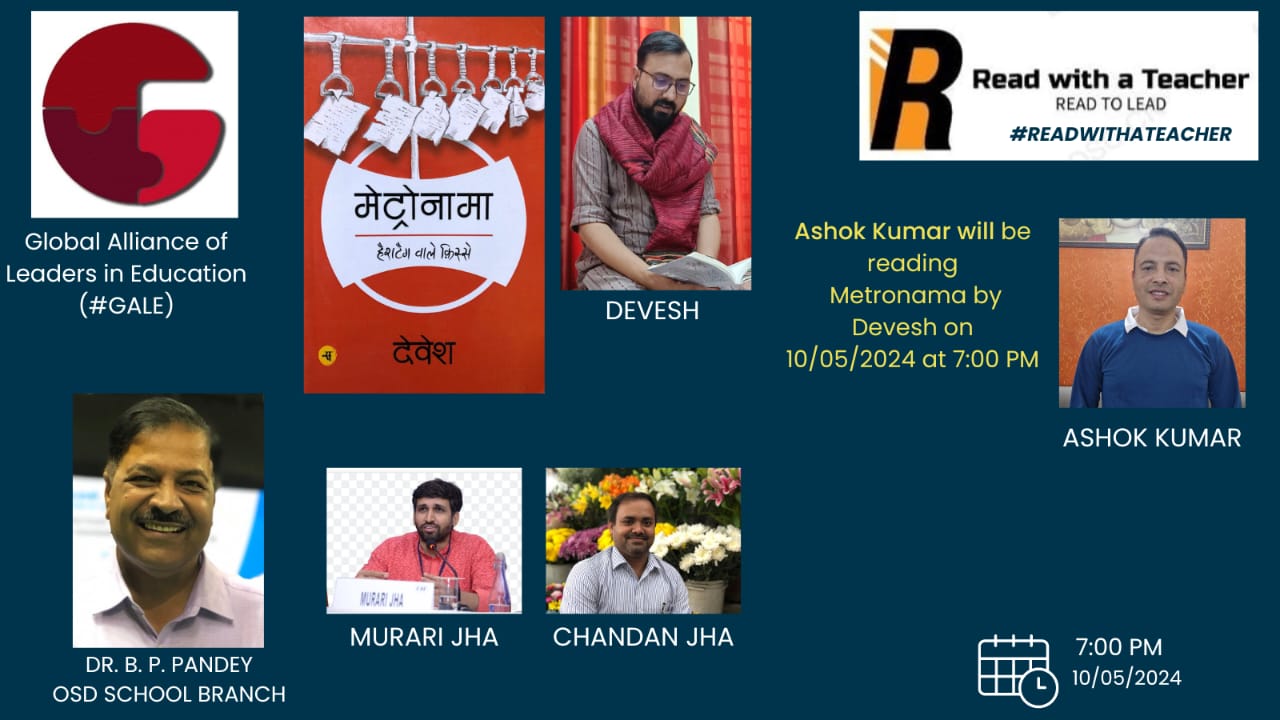
Metronama is a captivating exploration of Delhi's rapid urbanization through the lens of its metro system. Author Devesh invites readers on a subterranean adventure, delving into the stories of the city's diverse inhabitants who rely on the metro to navigate their daily lives. From the bustling commuters to the dedicated metro staff, Devesh weaves together a tapestry of human experiences that reflect the intricate social fabric of Delhi.
https://youtu.be/EMDEqj7ohDU?si=anzooz8jbSViFr9e
46. Pedagogy of the Heart
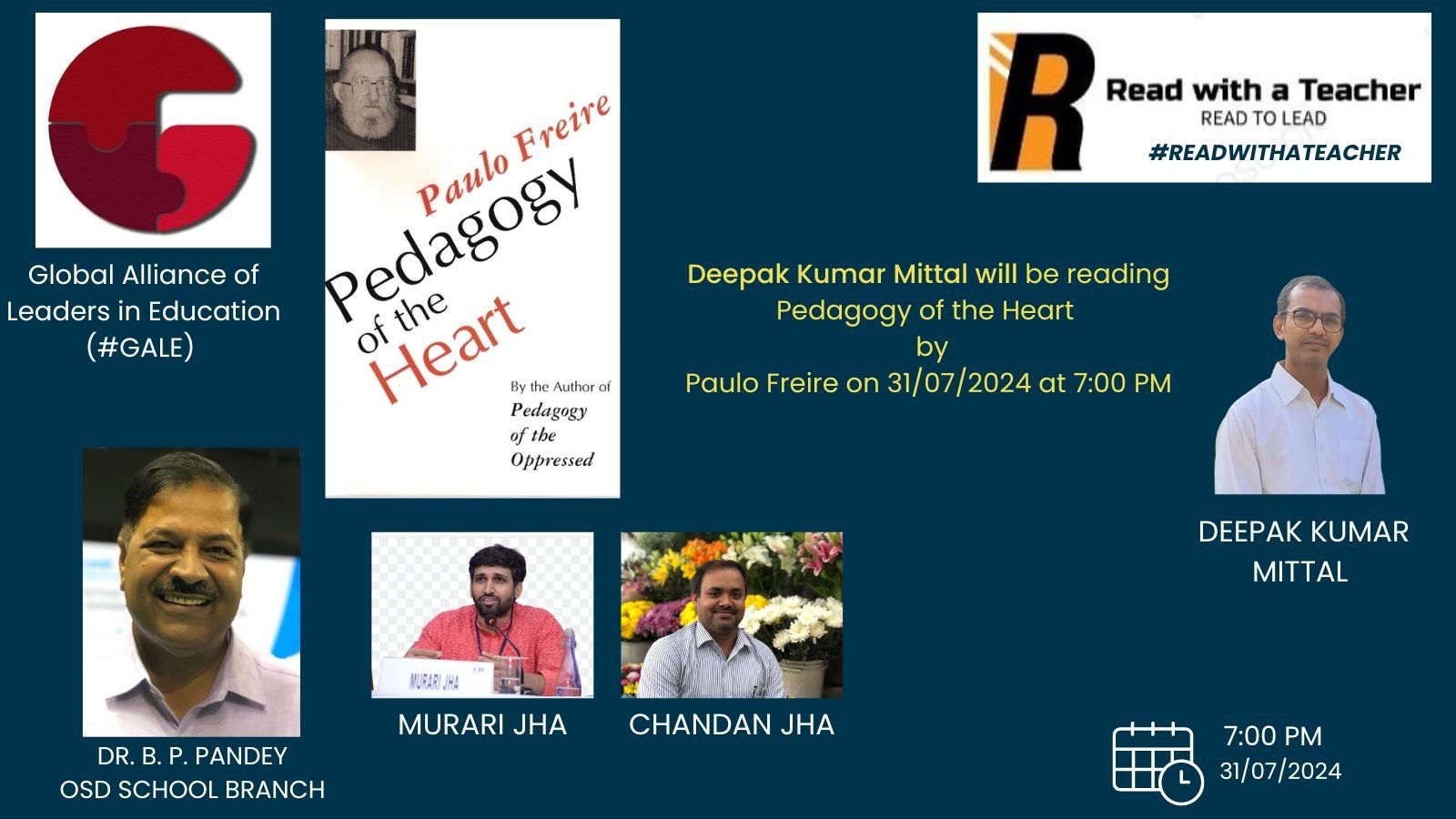
Pedagogy of the Heart by Paulo Freire is a reflective and deeply personal work that complements his influential educational theories. In this book, Freire explores the emotional and ethical dimensions of education, emphasizing the importance of love, empathy, and hope in the teaching process. He advocates for an education that goes beyond mere knowledge transfer, focusing on humanization, critical thinking, and the development of a compassionate worldview. Through personal anecdotes and philosophical insights, Freire challenges educators to inspire not only intellectual growth but also a deep emotional and moral engagement with students and society.
https://youtu.be/Up4yMrXFAE4?si=R778MhM72zdlT69Y
47. Experience and Education
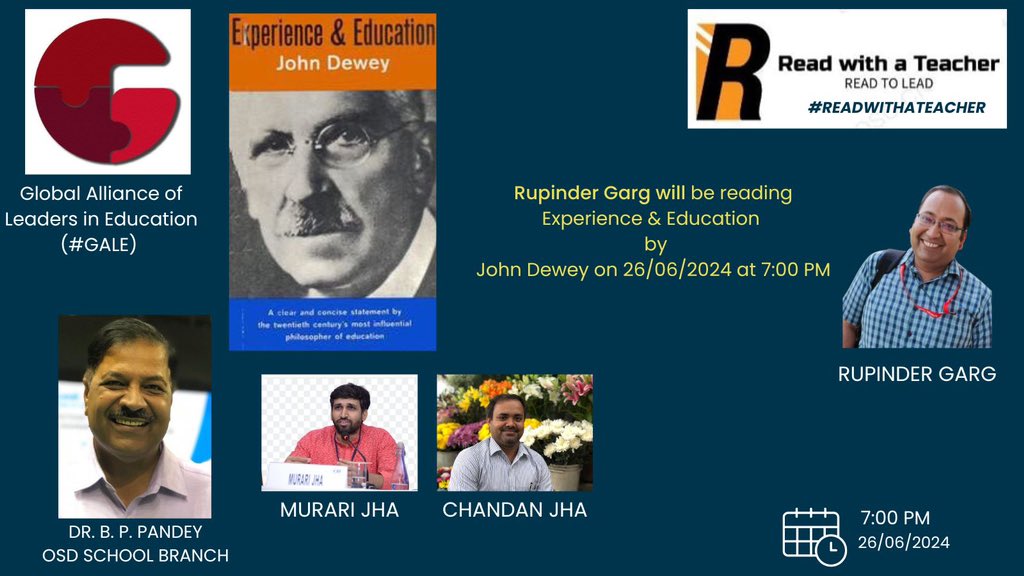
Experience and Education by John Dewey is a seminal work that explores the relationship between traditional and progressive education. Dewey critiques the rigid structure of traditional education while cautioning against the lack of structure in progressive methods. He argues that meaningful learning arises from the interaction of experience and reflection, emphasizing that education should be a continuous process that connects past experiences to present learning. Dewey advocates for an experiential, student-centered approach, where education fosters critical thinking, creativity, and personal growth. This book remains a cornerstone in educational philosophy, offering valuable insights into effective teaching and learning practices.
https://youtu.be/e8M716UMhe4?si=EEmiXSRBiKCYzb8o
48. Oliver twist
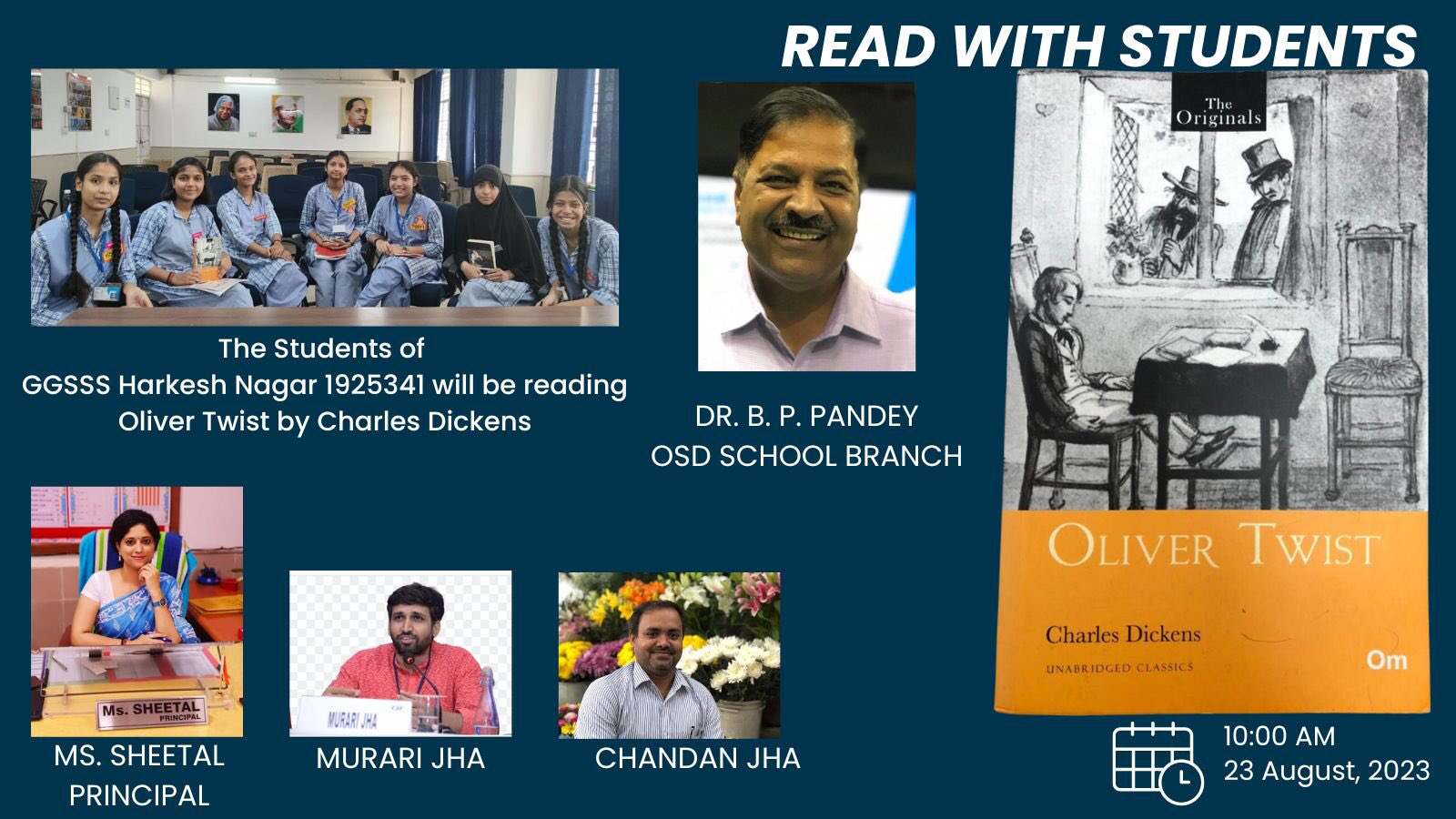
Oliver Twist by Charles Dickens is a classic novel that follows the life of an orphaned boy, Oliver, as he navigates the harsh realities of 19th-century London. Born in a workhouse and subjected to cruelty and poverty, Oliver's journey brings him into contact with criminals, including the notorious Fagin and the dangerous Bill Sikes. Despite the grim circumstances, the novel highlights themes of resilience, kindness, and the search for identity. Through Oliver's story, Dickens provides a powerful critique of the social injustices of his time, particularly the treatment of the poor and vulnerable in society.
https://youtu.be/Fp0orxK_cto?si=mVwCOrHL1KtUKWwW
49. The Midnight Library
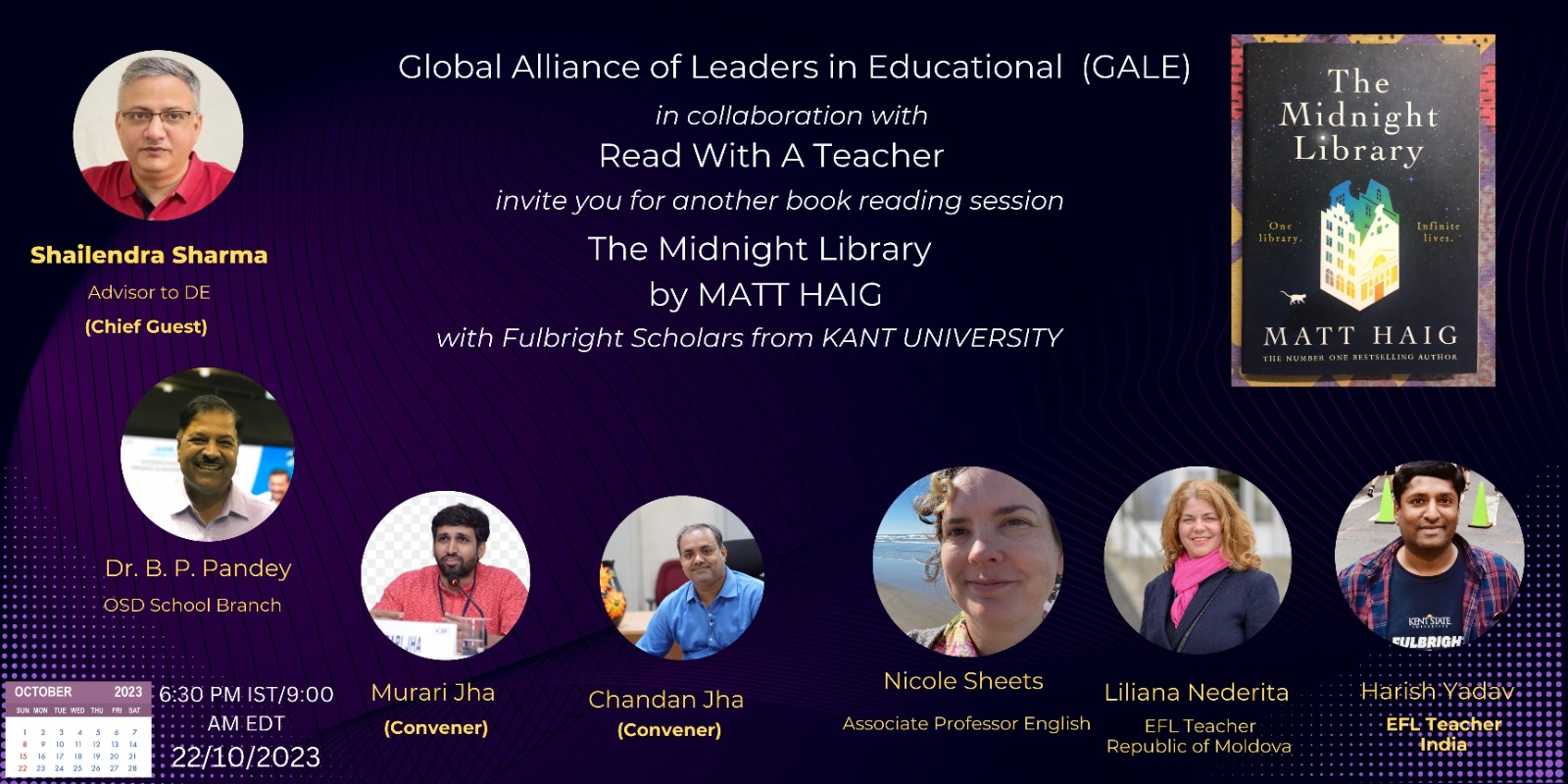
The Midnight Library by Matt Haig is a thought-provoking novel that explores themes of regret, choice, and second chances. The story follows Nora Seed, a woman dissatisfied with her life, who finds herself in a magical library between life and death. Each book in the library represents a different version of her life, based on the choices she could have made. As Nora explores these alternate realities, she gains insights into her regrets, desires, and the meaning of happiness. The novel beautifully reflects on the power of decisions and the idea that even small choices can shape our lives profoundly.
https://youtu.be/mLaJqi5MCyo?si=lZRCzeKcwY9wxfUJ
50. Smiling Chalk
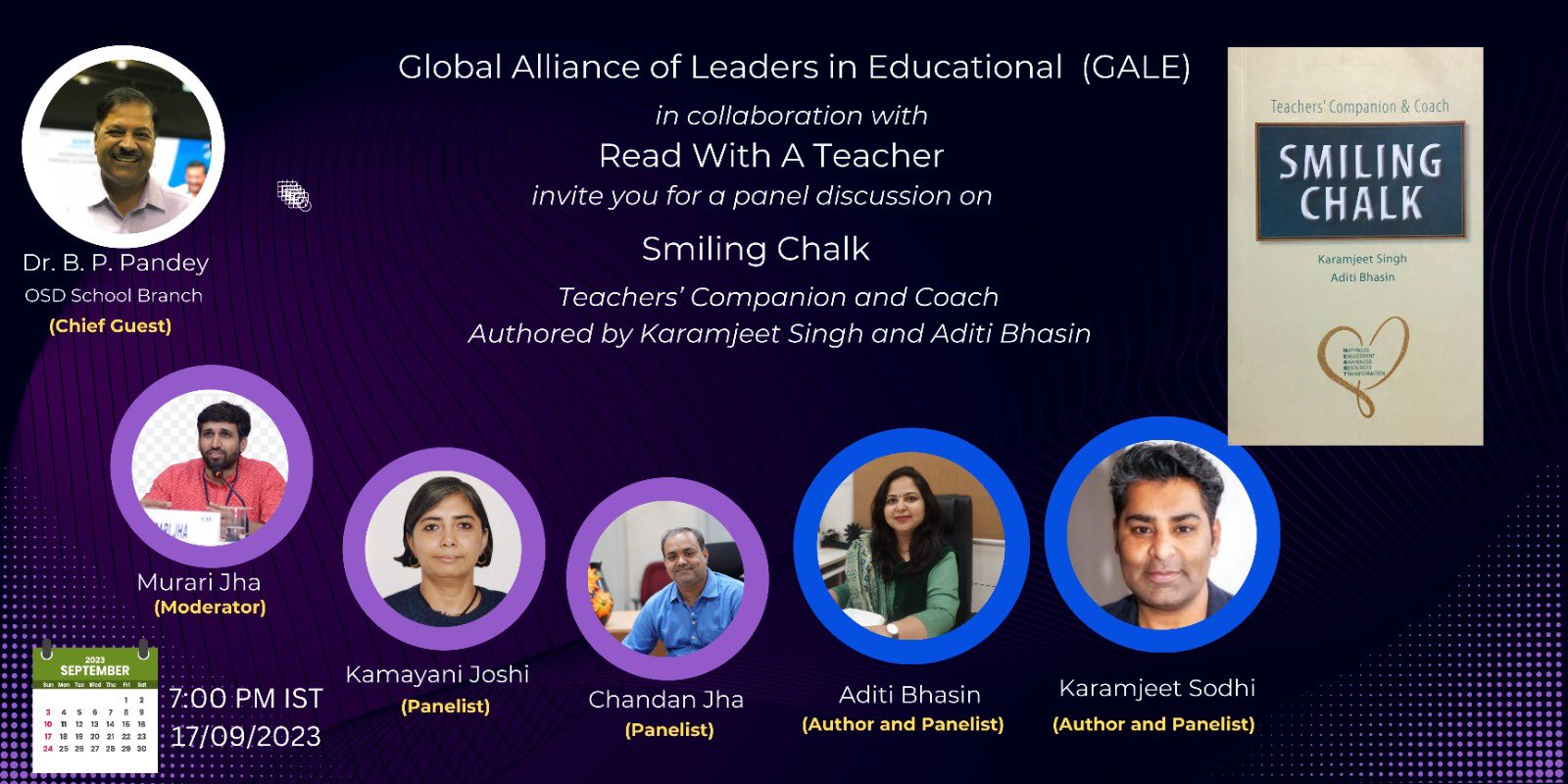
Smiling Chalk is a book that explores the essential elements of creating joyful, engaging, and effective classroom environments through the HEART framework. This framework focuses on five key aspects: Happiness, Engagement, Awareness, Resources, and Transformation. The book offers practical strategies for fostering positive, student-centered learning experiences, emphasizing the importance of teacher happiness and emotional well-being in the classroom. With insights on gamification, collaborative learning, and raising awareness, Smiling Chalk provides a holistic approach to education, aiming to transform both teachers' practices and students' experiences for lasting, meaningful impact.
https://youtu.be/1iwcNQE9Oc0?si=y5mZ0e2H2Uz2xFE8
51. MY COUNTRY SCHOOL DIARY by Julia Weber Gordon
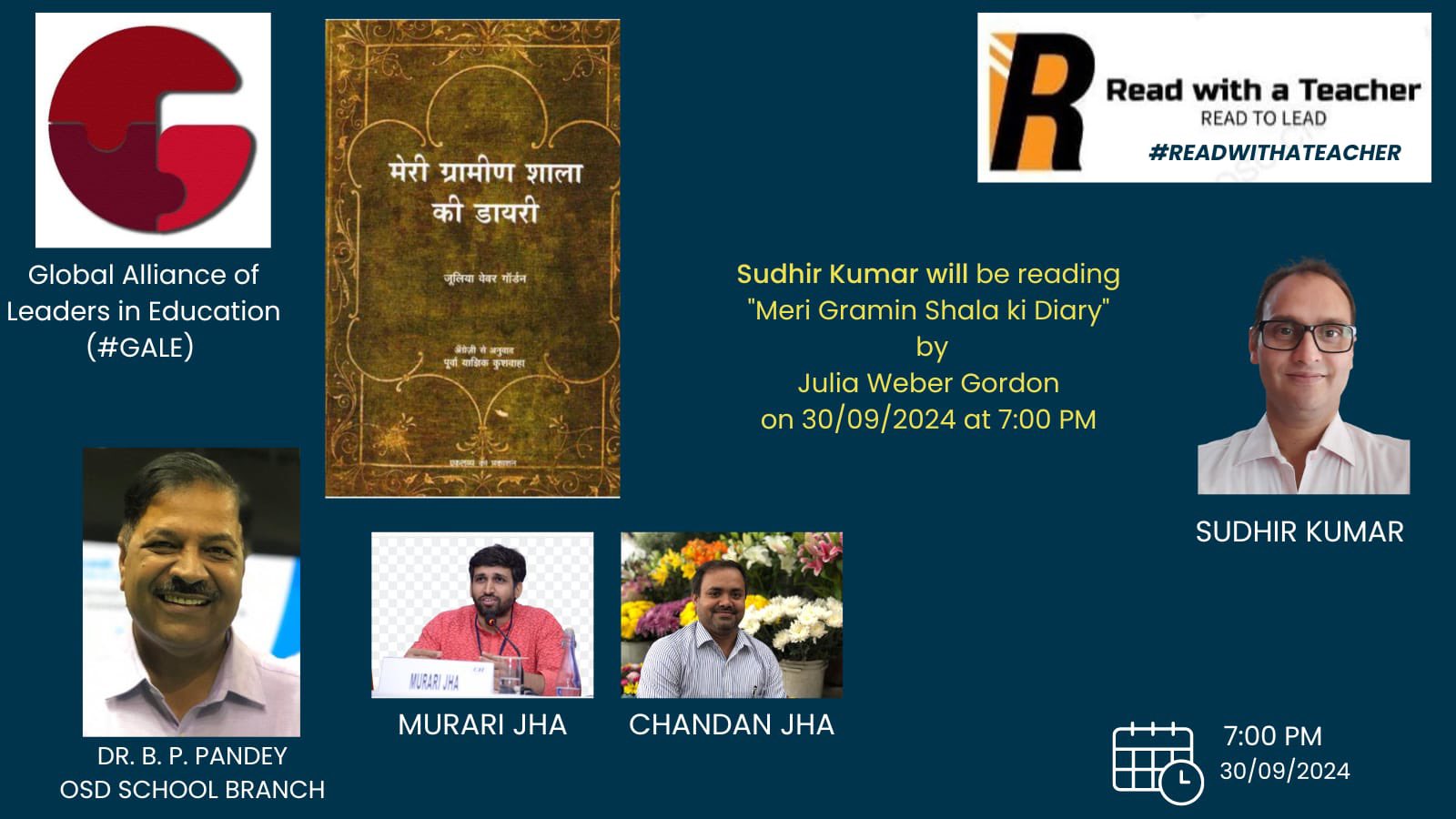
My Country School Diary by Julia Weber Gordon is a charming memoir that captures the essence of rural American education in the early 20th century. The book provides a heartfelt glimpse into life at a small, one-room country school, where the author, both a student and later a teacher, reflects on the joys and challenges of teaching in a close-knit community. Through vivid descriptions, Gordon paints a nostalgic picture of rural life, emphasizing the importance of education, community, and perseverance. The diary showcases the simplicity and beauty of country schooling, making it a touching read for those interested in education and history.
https://www.youtube.com/watch?v=ZzxDwfsqHjs
- Log in to post comments
